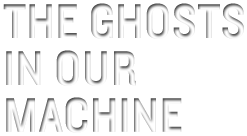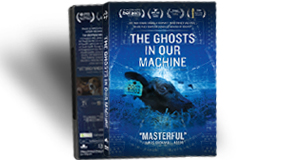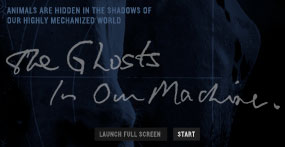Ingrid Newkirk
Founder, PETA
photo courtesy of PETA
I have been following the work of PETA since the early 1980s, and have been fascinated by their ability to bring the issue of animal liberation into the public eye. I am astutely aware of the critique of PETA’s tactics, yet I have supported their unapologetic commitment to raising awareness about the plight of nonhuman animals globally. It is with great respect that I recently had the opportunity of interviewing Ingrid Newkirk, Co-Founder and President of PETA.
– Lorena Elke
LE: Media is a powerful vehicle for dissemination of information that can lead to social change on a global scale. In a Mother Jones interview from 2008, you state “boldness has genius power and magic in it.” PETA’s bold media strategies over the years have been admired, and controversial. Can you talk about the rationale behind your campaign tactics?
IN: We have many and varied campaign tactics, from all the work you never or seldom hear about because it is “boring,” unsexy and non-confrontational – today’s media’s lifeblood – such as approaching corporations and government agencies, having done all the homework for them, with concrete ideas of how to switch from a process or product that causes significant suffering to animals (e.g. a test for environmental toxins or a polymer that is warmer than down in mountaineering jackets) to undercover investigations of cheese suppliers who still burn the horn buds out of cow’s heads. Few people realize that PETA employs more scientists than all the other animal protection organizations combined, or that we are changing minds and hearts among students in China, where keeping a low profile and saving face is vitally important to its citizens. What people do hear about is our cheeky campaigns, all designed to provoke discussion, to stir up argument, to make people have a laugh and then see there’s a serious side to this, to gawk at sexy models on our site only to learn something far more serious and what they can do about it, to challenge the status quo in all manner of ways. We are glad to have found a way to put animal rights into the news in the face of almost overwhelming competition from multi-million dollar advertisers, stories about war and human kidnappings, bank fraud, and car crashes. The fact that people know more or solely about our flashier bits, rather than realizing that every time you see a mannequin in a car safety commercial it is because PETA stopped the companies from crashing pigs and baboons into walls, certainly proves the argument that without gimmicks, the animal rights discussions would not be on the radar much.
LE: You have described yourself as a feminist. How do you view the intersection between feminism and animal rights?
IN: I believe in justice for all. I don’t like to characterize myself as a human being, a white person, or as a woman, which upsets some feminists, but as a living being. If you are against injustice, discrimination, exploitation, needless violence, bias, in principle then you “get” the connection. One should surely not just be a feminist because one relates in a narrow way, as in “I am a woman and therefore I understand the suffering of others like me in a narrow sense,” but a feminist because doing something awful to any living being simply because you don’t relate to them is unacceptable. Connie Salamon, who founded the Vegetarian Women’s Collective in New York used to picket feminist gatherings with a leaflet pointing out that it’s hard to talk about rights for yourself when you have the bones of a tortured female bird in your mouth. Susan Griffin in her wonderful book, Women and Nature, compares the “desirable” properties of a woman to those of a horse and cow at market. They both understood, back in the 80s. I think we must all be against true harm on principle and, if we are, we will all be animal rights proponents.
LE: You have acknowledged that your early connections with nonhuman animals, which led you to becoming an animal cruelty investigator, inevitably facilitated your life’s work in advocating for them. Yet because of our ever-growing commodification of nonhuman animals, people are often denied opportunities of personal connection with them. Within the context of our urban world, how can people develop empathy for nonhuman animals?
IN: Empathy is obviously the key to understanding, and the best exercise is the easy-peasy one of simply putting yourself mentally in the other’s “shoes.” I recommend doing that in all interactions with animals of any species. Just stop for a moment and think, what would I feel if someone was impatient with me, shooed me away from the little crumbs I drop when eating outdoors, yanked me by the neck, resented taking me out, kept me in a crate or cage, left me alone for hours, popped me into boiling water, or otherwise hurt, dominated or ignored me, my nature, who I am? I recommend books like Virginia Morell’s new one Animal Wise, Victoria Braithwaite’s Do Fish Feel Pain (yes, they do), Amy Hatkoff’s The Inner World of Farm Animals, Professor Marc Bekoff’s posts for Psychology Today are excellent eye-openers and, of course, I recommend peta.org and my own books, including The PETA Practical Guide to Animals Rights. Then, no matter where we live, we eat, wash our hair, clothe ourselves, buy things, and so wherever we are, we can wield enormous power of the purse by choosing to make compassionate, rather than cruel, purchases of anything and everything. We can also respect the dogs in our lives by not pulling them along on their precious walks, allowing them time, using a harness not a collar that discomforts them at every turn, remembering that it is we who are “spoiled” not them, that they are not children but displaced persons who in earlier times had their own lives to lead and decisions to make. Then, if we take a walk in the woods – and even in Washington DC there are marvelous networks of trails through parks – and then emerge to look at the concrete towers and paved roads and noise humans have created to replace those wondrous places, it is worth reflecting that we are all surrounded by the shrinking habitat (homes) of those we have displaced and now often seek to destroy with poisons and more: the deer, raccoons, opossums, birds, frogs, insects. Never be silent is a PETA motto that takes on great meaning when we realize that those tribes, if you will, of various species, have no rights and depend on us for representation: they are worse off, which is hard to think about, than the Brazilian tribes who are being encroached upon and are having their habitat destroyed and their lives placed in jeopardy. We have one of the most prized possession of any person: freedom of speech. Never be silent means using it to put forward our values, from stopping children from running through flocks of resting pigeons in the park (and getting help for any injured bird) to being counted at hearings for construction projects, for wildlife “reintroduction” (read Predator Reintroduction and ‘Game’ Number Manipulation) to wildlife control (read Slaughter).
Lorena Elke is a research consultant to The Ghosts In Our Machine. She is the author of If Cats Could Talk: A Holistic Approach to our Feline Companions. Raised in a hunting and trapping environment, Lorena learned as a little girl the horror of animal slaughter. She is a committed animal rights activist and animal rescuer.
Ingrid Newkirk is our Featured Animal Ambassador for June 2013.














It takes imagination to have compassion and Ingrid exemplifies that.
I’m so impressed that Ingrid has kept fighting for animals for not 5 years, or even 20, but 30 years and still has the same dedication and passion for animal rights. She is an inspiration for all of us who work for animals.
I, too, am impressed by Ingrid’s unending devotion and her ability to grasp things that most people–even those who claim to care about animals–simply do not, or will not, get. Her efforts are tireless–I’ve been fighting animal abuse for years and it’s exhausting–but Ingrid never gives up.